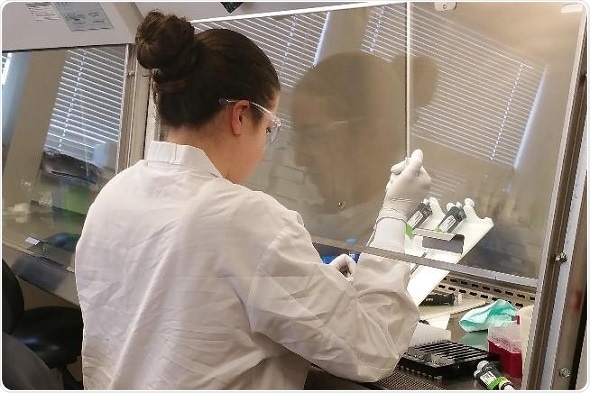Previous infection with either Zika virus or dengue virus has no apparent effect on the clinical course of subsequent infection with the other virus, according to a study published August 1 in the open-access journal PLOS Pathogens by David O'Connor of the University of Wisconsin-Madison, and colleagues. This work is timely, given recent efforts to develop an effective vaccine for Zika virus, as well as the introduction of dengue virus vaccines in areas where both viruses are now co-endemic.

Gabrielle Barry, a research specialist at the AIDS Vaccine Research Labs at the University of Wisconsin-Madison tests body fluids from rhesus macaque monkeys infected with the Zika virus searching for evidence of the virus on June 28, 2016 in Madison, Wisconsin. Credit: Breitbach et al. 2019
Zika and dengue viruses are related flaviviruses that now co-circulate in much of the tropical and subtropical world. The rapid emergence of Zika virus in the Americas in 2015 and 2016, and its recent associations with a neurological disorder called Guillain-Barré syndrome, birth defects, and fetal loss have led to the hypothesis that dengue virus infection induces cross-reactive antibodies that influence the severity of secondary Zika virus infections. It has also been proposed that pre-existing Zika virus immunity could affect the severity of secondary dengue virus infections. Data from in vitro experiments and mouse models suggest that pre-existing immunity to one virus could either enhance or protect against infection with the other. These somewhat contradictory findings highlight the need for immune-competent animal models to understand the role of cross-reactive antibodies in flavivirus infections.
In the new study, O'Connor and colleagues examined secondary Zika virus or dengue virus infections in rhesus and cynomolgus macaques that had previously been infected with the other virus. They assessed the outcomes of secondary Zika virus or dengue virus infections by quantifying viral RNA loads, clinical and laboratory parameters, body temperature, and weight for each cohort of animals and compared them with control animals. These comparisons demonstrated that within one year of primary infection, secondary infections with either Zika virus or dengue virus were similar to primary infections and were not associated with enhanced or reduced disease severity. All animals had asymptomatic infections and, when compared to controls, did not have significantly perturbed blood parameters. Although additional studies are needed, the findings suggest that vaccination against either dengue virus or Zika virus may not influence the severity of disease upon secondary infection with the other virus.
"Within a year of primary DENV or ZIKV infection, we did not observe any significant enhancement of, nor protection from, secondary infection with the opposite virus in non-pregnant macaques," the authors add. "Our results differ from those shown in tissue culture and immunocompromised mouse models and aligns more closely with current human epidemiological data where enhanced secondary Zika infection has not been reported after primary dengue infections."
Source:
Journal reference:
Breitbach, M.E. et al. (2019) Primary infection with dengue or Zika virus does not affect the severity of heterologous secondary infection in macaques. PLOS Pathogens. doi.org/10.1371/journal.ppat.1007766.